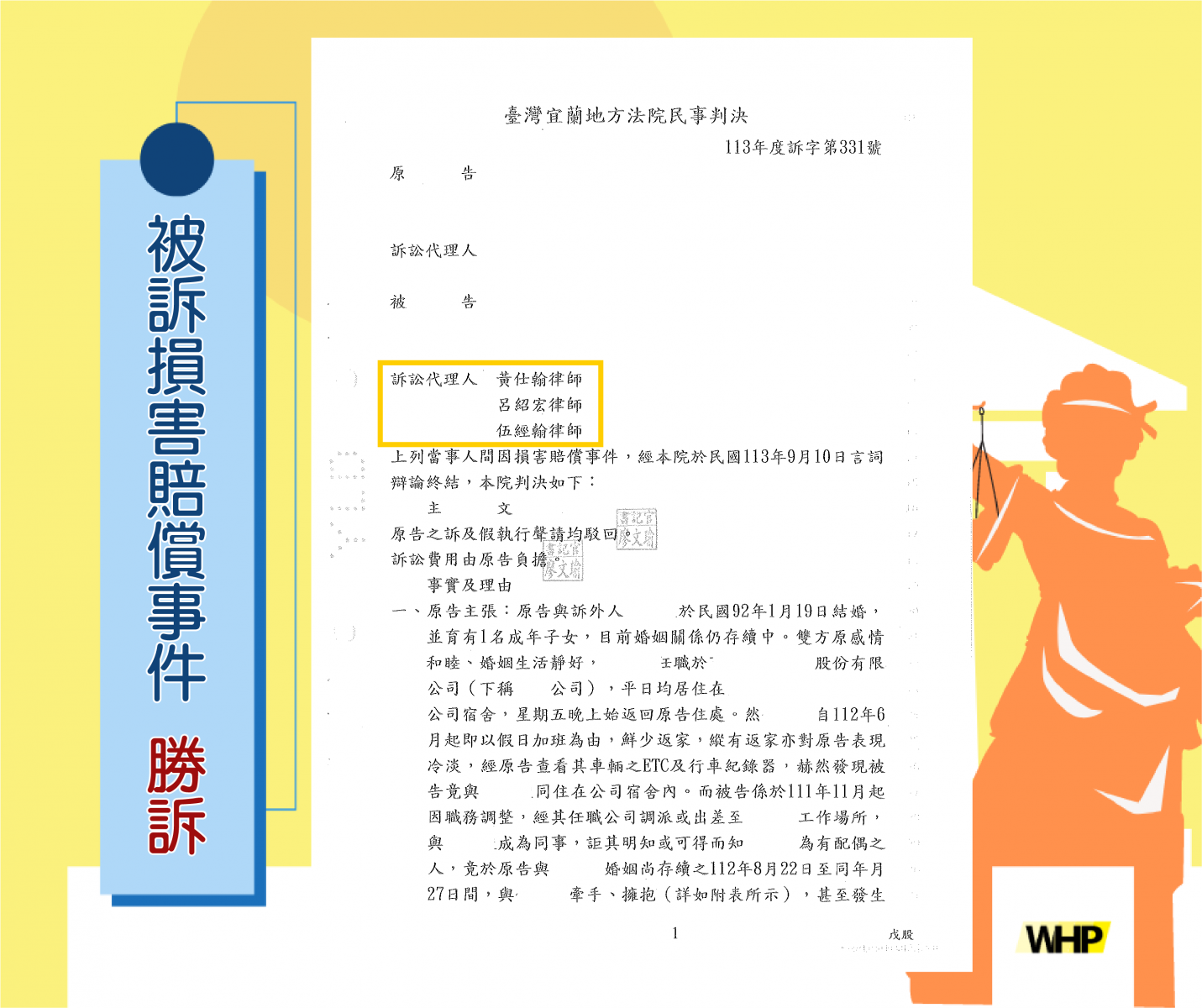首頁 >
| Damages Compensation | Our Client Was Accused of Infringing Spousal Rights but Was Ultimately Exonerated!

Relevant Legal Provisions
| Any person who intentionally or negligently infringes upon the rights of another person unlawfully shall be liable for damages. The same applies to those who intentionally cause harm to others by means contrary to good morals. | |
| If a person unlawfully infringes upon another person's body, health, reputation, freedom, credit, privacy, chastity, or other significant personal rights and the circumstances are severe, the victim may claim compensation even if there is no financial loss. The person whose reputation has been harmed may also request appropriate measures to restore their reputation. | |
| The provisions in Chapter 2 of Part IV of the Civil Code on marriage, which do not allow two individuals of the same gender to form a permanent of intimacy and exclusivity for the purpose of managing a common life, violate the spirit of Article 22 (protection of personal freedom to marry) and Article 7 (protection of equality) of the Constitution. Relevant authorities must amend or enact laws within two years of the announcement of this interpretation to ensure equal protection of the freedom to marry. The manner of achieving this equal protection lies within the legislative scope. | |
| Article 239 of the Criminal Code, which stipulates that “a married person who commits adultery shall be sentenced to imprisonment for not more than one year, and the co-offender shall be punished likewise,” imposes a restriction on the right to sexual autonomy under Article 22 of the Constitution that violates the principle of proportionality under Article 23 of the Constitution. The proviso to Article 239 of the Code of Criminal Procedure, which states that “if the spouse withdraws the complaint, the effect shall not extend to the co-offender,” violates the spirit of Article 7 of the Constitution, which guarantees the right to equality. |
Facts and Reasons
Our client (the defendant) and Mr. H, a third party in this case, were colleagues living in the company's dormitory. They engaged in normal social interactions. Due to marital discord between Mr. H and his wife (the plaintiff), the plaintiff accused our client of infringing upon her spousal rights and sought NT$1 million in emotional damages.
Arguments by Our Firm's Lawyers
According to the Judicial Interpretation, spouses are independent individuals. The marital obligation of loyalty does not grant one party the right to control the other’s will or autonomy. Thus, the concept of "spousal rights," implying exclusive use and control over a spouse, should not be recognized. Therefore, the defendant did not infringe upon the plaintiff's "rights."
Furthermore, the defendant and Mr. H worked in different departments and were unaware that Mr. H was married. Both parties lived in the company's dormitory due to work reasons, and their interactions remained within the bounds of normal social conduct. No sexual relationship occurred. The estrangement between Mr. H and the plaintiff was a private family matter beyond the defendant's involvement.
Judgment
The plaintiff's lawsuit and request for provisional execution were both dismissed.
The court found that the videos and screenshots submitted by the plaintiff did not indicate that the defendant knew Mr. H was married. Additionally, the transcripts of the recordings provided by the plaintiff did not contain statements from the defendant, nor did they show that the defendant knew Mr. H was married.
The court found that the videos and screenshots submitted by the plaintiff did not indicate that the defendant knew Mr. H was married. Additionally, the transcripts of the recordings provided by the plaintiff did not contain statements from the defendant, nor did they show that the defendant knew Mr. H was married.
Since the plaintiff was unable to provide further evidence proving that the defendant was aware of Mr. H’s marriage, the court could not conclude that the defendant intentionally infringed upon the plaintiff's spousal rights. Therefore, the plaintiff’s claim for NT$1 million in emotional damages based on tort law was deemed unsubstantiated.
(Note: To protect the client's interests, certain case details and judgment images have been redacted and modified. For a full review of the case, please refer to the Judicial Yuan's judgment database)
Attorneys:Vincent Huang、Herman Lyu、Timothy Wu
-
03.25 2025
Successful acquittal of lawyer's dummy account def...
-
03.18 2025
Divorce | Claim for Distribution of Remaining Prop...
-
03.11 2025
Criminal Second Instance | Report of Winning a Law...
-
02.25 2025
Civil | Second-instance case of demolition and lan...
-
02.18 2025
Car Accident | Volunteer Traffic Officer Hit by Ca...
-
02.11 2025
Car Accident | Our Lawyer Successfully Assisted th...
-
02.04 2025
Traffic Accident | Lawsuit for Serious Injury Succ...
-
01.21 2025
Fraud | Dummy Account Defendant Successfully Obtai...
-
01.14 2025
Criminal and Civil | Our Lawyer Successfully Helpe...
-
01.07 2025
Obstruction of Sexual Autonomy | Accused of Taking...
-
12.31 2024
Civil Case | Claim for Compensation Adjustment, Vi...
-
12.24 2024
Defamation | Uploading Photos to a Gossip Forum Le...
-
12.17 2024
Civil Case | False Claims in Assignment of Debt: V...
-
12.10 2024
Sexual Harassment | Defendant Not Prosecuted for S...
-
12.03 2024
Breach of Trust | Defendant Successfully Acquitted...